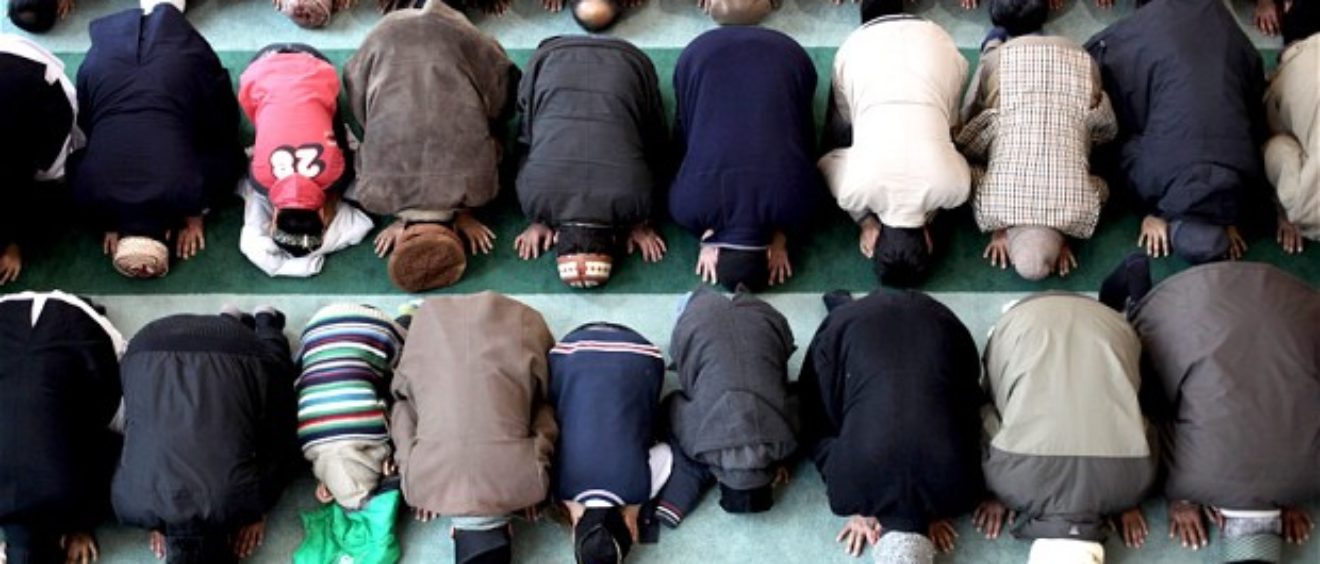
Should a Christian Therapist Treat a Muslim Client?
Building rapport with patients is a given in psychotherapy. But what happens when two faiths collide in session? Suddenly, theory can go out the window, and therapy can become a battle of the wills, as the tenets of psychotherapist’s and the patient’s own religious traditions “butt heads,” creating barriers to healing. In this article, Michael Angelo, Licensed Clinical Professional Counselor, and owner of Encompass Counseling Center, examines his own Christian beliefs and how they can impact his ability to connect with other religions, including the Muslim community.
Imaging this scenario: The family of a Muslim preschool boy who drowned requests that teachers read the following statement in class:
By now, all of you probably know about the sad news in our school. All of you know that Yusuf is not here anymore. Some of you may not know what happened. He was playing outside with his brother on Thursday evening. Then they went inside. After a few minutes, his brother and mom realized that Yusuf was missing, so they went looking for him. They found Yusuf in the swimming pool, and his brother jumped in and brought him out of the water. Yusuf’s heart was not beating anymore. Quickly, the ambulance came to take him to the hospital. The doctors and his mom tried to make his heart start again, but they could not. We know that Allah, subhana xua ta’ala (most glorious, most high) decided to take him to jannah. We know that Yusuf is happy in jannah and has everything he wants (Baggerly & Abugideiri, 2010).
Is it Allah’s will to take Yusaf to jannah? Is Yusaf happy in jannah? Does he have everything he wants? These questions and others run through my mind as I reflect on the situation with this preschooler. As a Westerner with very different religious beliefs than someone from the Islamic faith, I have my doubts that Yusaf is in jannah. There is no jannah in my opinion, and Allah is a fraud. He is a false god, and unless Yusaf accepted Jesus as his Lord and Savior, he is in hell, suffering for not repenting of his sins before he died.
It’s what God holds as absolute truth for anyone apart from Christ. Calling yourself a Christian or going to church is not enough for you to gain entrance into heaven. You must ask the Lord to forgive you of all the wrongs you have ever done, no matter how tiny or insignificant you deem them to be. And, you must be truly sorry for every wrongdoing. This is an unconditional requirement for every individual on earth, whether adult or child, regardless of his or her religious or spiritual beliefs.
Saying you don’t embrace divine principles doesn’t excuse you from eternal punishment, either. It would as foolish as saying that you don’t believe in gravity because you can’t see it, and then proceeding to jump off a tall building, thinking you will survive.
Just as there are physical principles in the world, so too are there spiritual principles, the chief among them is that people are lost without Christ. Period! End of story!
It’s not what I made up. Jesus talks plenty about those without hope in the New Testament. He also mentions more than once the way to remedy hopelessness: confess you’re your tongue that Jesus in Lord and believe in your heart that God raised him from the dead, and you shall be saved.
Whew! I feel better for getting this out in the open, even though you may think less of me for stating what I believe. How I can be congruent with myself or a potential Muslim client— whether child or adult—without owning up to my true feelings about Islam, deciding if the gap in dogmas between the individual and me is too great to bridge?
I can’t be an effective counselor if I deny the tenets of my faith, failing to integrate them into discussions of death or life. But perhaps I should recuse myself from working with those holding Muslim beliefs, or any beliefs that don’t align with my own?
You may be wondering about that, as well. Maybe you think others things about me that are much worse. I can’t control what you think. But I ask that you hear me out, as I use this assignment to process why I should consider working with a culturally diverse population such as Muslims.
It has everything to do with my growth as a person and therapist. And though I don’t plan to be a school counselor—where most of the interactions with Muslim clients would occur in the form of Muslim school children—I might also have Muslim parents come to me to discuss the death of their child. They may bring siblings of the deceased. It’s possible, given the growing number of Muslims immigrating to the United States from various countries around the globe, some of whom do not hold to traditional beliefs that counseling with a professional is unnecessary or dissuaded.
Baggerly & Abugideiri (2010) estimate that more than six million Muslim adults and children live in the United States. Approximately 33 percent are South Asian, 30 percent are African American, 25 percent are Arab, and 12 percent are categorized as other, according to the authors. Some of them are certain to be nominal in their faith, just as many nominal Christians exist—meaning that there is a real possibility that Muslim clients may walk through my door.
Even if the topic is not death or the issue does not center on mourning a loss, I still need to have a basic understanding of what Islam teaches about life and, as importantly, how it views death, if I hope to be helpful to them. Any conversation about faith must include not only an emphasis on life but also on death.
For Muslims, death is the will of Allah and a part of life (Baggerly & Abugideiri). The authors state that the basis of the Islamic view of death is “the underlying belief . . . that one should and can take comfort knowing that life and death are in accord with God’s will, that the soul returns to God, and that the community is supportive of the bereaved. Muslims are expected to bear their loss patiently, in acceptance of God’s will” (2010).
I couldn’t agree more. Christianity’s weight should be placed on preparation for death, from the moment of birth on, with the understanding that water baptism is not a free ticket to paradise. Jesus instructs the religious leader, Nicodemus, in the third chapter of the Book of John about this. Christ tells him that he must be born again of the Spirit if he wants to see the kingdom of heaven (John 3: 3-8, New International Version).
That’s the starting point of faith. There’s also growth of a believer to consider.
Writing in 1 Corinthians 9: 24-25, the apostle Paul equates growing in faith with running a race. “Do you not know that in a race all the runners run, but only one gets the prize?” he said. “Run in such a way as to get the prize.”
What is the prize? It is a crown that will last forever, one earned not through our own merits but through God’s grace alone, according to Ephesians 2: 8-9. No good works—our own efforts—will guarantee us our salvation.
How do I reconcile this spiritual reality with the physical reality of death, as it presents itself in my office in the form of Muslim parents grieving over their dead child? What about other issues? Can I not let my beliefs creep in, regardless of the topic?
I’m not worried. As a Christian, I am commanded by God to love to all people, not just the one I choose. It is my sacred duty to mourn with those who mourn, and to be particularly sensitive to matters involving little children, whom the Scriptures say that Christ loved and adults must be like if they hope to enter God’s kingdom (Mark 10: 13-15, NIV).
It was the focus on a young child’s death that drew me to the Baggerly & Abugideiri article. Their research stimulated my thinking on matters of faith and challenged my notion of what it meant to be a counselor who was a Christian. To me, this was quite different than being a Christian counselor.
I don’t work exclusively with Christian clients; my scope is broader, namely, to serve as an influence to all people, regardless of what they believe about God—or if they believe nothing about him at all. God is no respecter of persons; he loves everyone equally. Who am I to love someone less?
Parents who have lost a child experience immeasurable grief. Their hearts ache beyond belief, and their minds spin uncontrollably over the details, wondering if they could have done something differently to prevent the tragedy. Faith can be a comfort in these times. Islam teaches that children who die will be in jannah because they have not reached the age of accountability (Baggerly & Abugideiri, 2010).
There is debate in Christian circles as to what age a child is accountable to God. Is it a cop-out to say that only God knows? It’s true: Only God does know.
In any case, in a therapeutic session with Muslim parents trying to deal with the death of their son, there is no place for a discussion about accountability or age, unless they bring it up. They might, since Muslims’ views of death vary greatly on the basis of their ethnic backgrounds, cultures, acculturation to the United States, and levels of religiosity.
How do I respond if Muslim parents want to explore a topic like age of accountability? What if I am asked, “Do you think my son is in jannah?” What answer should I give?
When discussing death individually or in small groups, Baggerly & Abugideiri (2010) suggest that counselors use general strategies with appropriate adaptations for the Muslim worldview. This requires that I know something about their perspective.
The thought Study up, Michael comes to mind. So does the idea of asking my clients if they could teach me about their beliefs so I could be more informed clinically and more effective therapeutically.
There would be nothing wrong, in my opinion, to ask, “What does your religion and culture teach you about death?” and “How does this belief help you or make it difficult for you to deal with death?” This is what good therapists do. They seek to understand the issue from the client’s point of view, to approach healing from his or her perspective, to not come across as prideful or arrogant but rather to build rapport by asking for details, not assuming they know everything and have nothing left to learn. What client would want to collaborate with a know-it- all counselor?
Instead, if they are Muslim, there’s a good chance they would want me to start by understanding Islamic mourning and burial rituals and accepted healing practices. Islam stipulates that the formal mourning period is three days, during which time friends and relatives visit the family of the deceased to offer condolences. People often recite the following verse from the Qur’an: “to Allah we belong and to Him is our return. Non-Muslims may softly say, “I am so sorry,” and then site silently with the bereaved for a while (Baggerly & Abugideiri, 2010).
Reading the Qur’an is often comforting, Baggerly & Abugideiri report. Parents who experience the loss of a child may also take comfort in hadiths (traditions of the prophet Muhammad), one of which describes the reward of paradise that God promises to the parents (2010).
Funerals typically occur within 24 hours of the death and can be held in a mosque, in a prayer hall, or at the grave site. The imam (Muslim religious leader) leads the congregational prayer and may offer a sermon and prayers for God to forgive and have mercy on the deceased, according to Baggerly & Abugideiri (2010).
The authors go on to say that relatives and friends are encouraged to resume their usual routines as much as possible after three days of grieving. In contrast, no time limit exists for the expectation of recovery, especially after a sudden death.
“A return to functioning should be distinguished from managing memories and attachments to the deceased, which takes more time,” the researchers indicate.
Muslims manage memories and attachments through various personally meaningful methods, such as writing poetry, reading the Qur’an, or doing good deeds for the benefit of the deceased. Praying is also encouraged since it provides bereaved family members with a source of comfort, as they connect with God, feel supported by his presence, and are reminded that ultimately, all people will return to their Creator (Baggerly & Abugideiri, 2010).
Knowing these rituals and practices could be immensely helpful to me as the counselor. For example, I could ask the parents to share any poems they may have written or good works they have completed in an effort to process what has happened to their son. Even if they weren’t willing to impart what they have done or written, the mere fact that they have completed these tasks means they are taking steps in the direction of healing.
I would also encourage them to continue reading the Qur’an, and praying. What I would need to guard against is my bias of believing these measures won’t work because they based on a false religion, which has no power to do anything but place its followers into further bondage with each new expression of faith.
My concerns over my prejudices may be a moot point anyway, since many Muslims have a negative view of mental healthcare providers, due to unfamiliarity with the role that mental health clinicians serve in American society (Baggerly & Abugideiri, 2010). In many other countries, the researchers said that mental health professionals treat only people with severe mental illnesses, such as schizophrenia, rather than people who are adjusting to life’s challenges. Furthermore, a person’s family and faith in God are expected to be enough to solve problems. In addition, disclosing a personal or familial problem outside of the family is discouraged (2010).
“Psychological symptoms are often experienced somatically because physical symptoms, such as fainting or headaches are more socially acceptable,” Baggerly & Abugideiri state.
One avenue of entrance into connecting with potential Muslim clients is through grief counseling interventions held at the school. The opportunity may be limited to school counselors only. I am not sure.
Other inroads might exist through connections with Muslim community leaders. As a counselor interested in helping the Muslim population, I could let leaders know about children’s typical grief responses and developmentally appropriate interventions, and offer to provide a guidance lesson to children at the local mosque. Muslim leaders could share with me their beliefs on grief and loss, deepening my understanding of the values they hold toward suffering and sorrow, and chipping away at any stereotypes that remain in my mind toward them or their religion.
Taking the time to build relationships with Muslim community leaders can lead to increased trust by Muslim families in need of counseling, according to Baggerly & Abugideiri. The authors finish by saying that when collaborating with Muslim families and community members, counselors can find personal warmth and generosity, as well as external resources, that will help Muslim children through their bereavement (2010).
I see the potential for carry-over into other areas of psychotherapy. Generosity and personal warmth are not characteristics essential only for death and dying. They are indispensible traits for any form of counseling.
With them at my disposal, I am confident I can continue to soften my stance toward other religious faiths and beliefs, and accept people for who they are what they believe. Baggerly & Abugideiri have been a catalyst in this regard. For them, I am thankful.
References:
Baggerly, J. & Abugideiri, S.E. (2010). Grief counseling for Muslim preschool and elementary school children. Journal of Multicultural Counseling and Development, 38(2), 112-124.
The Holy Bible, New International Version, Tyndale House Publishers, 2003, 2005, 2009, 2014.




